|
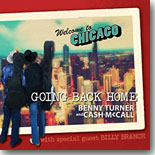
Benny Turner and Cash McCall began their
friendship in Chicago over 60 years ago.
Turner and his older brother Freddie King
learned to play guitar from their mother and
Turner played bass in King’s band for many years
before joining Mighty Joe Young and later Marva
Wright, the Blues Queen of New Orleans, also
appearing on gospel recordings with Otis Clay
and recording a few singles for M-Pac! and One-Derful!
labels. Recently, he’s enjoyed a resurgence of
sorts with a pair of dynamite releases on Nola
Blue Records and an award-winning autobiography.
McCall, born Morris Dollison, Jr., traveled a
similar path, working on the gospel circuit,
recording for several labels, including Paula
and Checker as an R&B artist. He also co-wrote
Otis Clay’s hit, “That’s How It Is (When You’re
In Love).” McCall also worked with Willie Dixon
as part of Dixon’s Chicago All-Stars and
co-produced Dixon’s final album, Hidden Charms,
which won a Grammy. In 2007, McCall teamed with
Dixon’s grandson, Alex, to form The Blues
Experience, which released a very good album,
The Vintage Room.
In early 2018, Turner was inspired to track down
McCall after hearing of the death of gospel
singer Clay Graham of the Pilgrim Jubilees.
McCall had settled in Memphis a few years back
but was in ill health battling stage four lung
cancer. The two talked by phone a few times and
decided to collaborate on a project paying
tribute to their shared roots in Chicago blues.
The resulting album, Going Back Home (Nola Blue
Records), is a wonderful collection of Turner and
McCall’s versions of nine of the Windy City’s
finest tracks.
Turner plays bass throughout the set and takes
lead vocals for five of the songs, including
Harold Burrage’s “Got To Find A Way,” which is a
duet with his daughter Carla Davis. McCall plays
rhythm guitar on this track, just like he did
on Burrage’s 1965 version. Turner’s daughters
Benita, Carla, and Yvette also take background
vocals, making this effort a real family affair.
He also gives a smooth reading on the midtempo
shuffle, “Poison Ivy,” a ripping take on Elmore
James’ “Shake Your Money Maker” (with slide
guitar from Butch Mudbone), a rollicking read of
G.L. Crockett’s “It’s A Man Down There,” and
Willie Dixon’s “Built For Comfort.”
You’d never know that McCall was ill by
listening to his contributions, both on vocals
and rhythm guitar. He turns in a solid cover of
“Spoonful,” with support on harmonica from
Johnny Sansone and Joe Krown on keyboards (whose
work is excellent throughout), and a splendid
effort on Tampa Red’s “It Hurts Me Too,” which
also features Billy Branch on harmonica and
Mudbone on slide guitar. According to the liner
notes, Turner (who provides emotional supporting
vocals on the track) insisted that McCall do
this tune because “he (McCall) was sick and it
hurt me that he was so sick.” McCall also gives
his own unique version of the old-time standard
“The Dirty Dozens,” a song Turner used to play
behind Chicago piano legend Johnny Jones at the
Squeeze Club. McCall brought one original to the
proceedings, the easygoing “Money,” a tune he
wrote several years before that speaks many
truths.
The closing track features Turner and McCall
backing Billy Branch on “Bring It On Home,” and
Branch doesn’t disappoint on harmonica or
vocals. He previously recorded this track on his
mid ’90s Verve release, The Blues Keep Following
Me Around, but this version has more of a
slippery funk feel and concludes with Branch,
Turner and McCall planning a trip to hear some
blues in Chicago.
There’s not a lot of new ground broken on Going
Back Home, just a lot of traditional blues
played extremely well by a group of musicians
who obviously had a blast doing it. Sadly,
McCall passed away on April 20th, but thank
goodness he and Turner were able to record this
wonderful set before his passing. Chicago blues
fans will want --- make that NEED --- this set in
their collection.
--- Graham Clarke
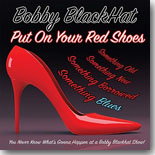 Bobby “BlackHat” Walters is a retired U.S. Coast
Guard Commander, having served for 27 years,
including time as Military Aide to the
President, and he was awarded the Coast Guard
Medal for Heroism. The Cleveland, Ohio native has
also played harmonica for over 40 years,
performing with Kenny Neal, Jason Ricci, Eddie
Shaw, Ruthie Foster, Slam Allen, Tas Cru, Mick
Kolassa, and Memphis Gold, and opening for blues
legends B.B. King, Bob Margolin, and Taj Mahal.
Now based in Newport News, Virginia, Walters advanced
to the finals of the I.B.C in 2016. Bobby “BlackHat” Walters is a retired U.S. Coast
Guard Commander, having served for 27 years,
including time as Military Aide to the
President, and he was awarded the Coast Guard
Medal for Heroism. The Cleveland, Ohio native has
also played harmonica for over 40 years,
performing with Kenny Neal, Jason Ricci, Eddie
Shaw, Ruthie Foster, Slam Allen, Tas Cru, Mick
Kolassa, and Memphis Gold, and opening for blues
legends B.B. King, Bob Margolin, and Taj Mahal.
Now based in Newport News, Virginia, Walters advanced
to the finals of the I.B.C in 2016.
Put On Your Red Shoes is Walters’ sixth release
and is subtitled Something Old, Something New,
Something Borrowed, Something Blues. It’s a
12-song collection of updated versions of
previously released songs (Something Old), brand
new tunes (Something New), interesting covers of
blues classics (Something Borrowed), and,
naturally, Something Blues throughout the disc.
He’s backed by Brian Eubanks (bass, backing
vocals), Tom Euler (guitar, backing vocals),
Michael Behlmar (drums, backing vocals), and
Lucy Lawrence Kilpatrick (keyboards), with guest
artists Cal Hamlin (organ), Larry Berwald
(guitar, pedal steel), and Lucius Bennett
(vocals, backing vocals).
The opening track, “I Smell Another Man On You,”
is a fabulous starting point, a unique approach
to the familiar cheating theme. Walters and
Euler both get considerable space to shine on
harmonica and guitar, respectively. “Overdose Of
The Blues” is a fine slice of Windy City-styled
blues, and “This Grey Beard” is an acoustic
ballad that reflects on a man’s life and lessons
learned. The title track is next, a funky,
Latin-flavored shuffle, followed by a gorgeous
cover of Leonard Cohen’s “Hallelujah,” with
Walters’ harmonica front and center.
“Baby Mama Drama Blues” is a rocking blues
cautionary tale, and the sobering slow blues
“Grim Reaper,” clocking in at nearly ten
minutes, focuses on mortality. “May I Have This
Dance” has more of a country feel, but works
really well, “Back To Cleveland” is a funky
tribute to Walters’ hometown, and “When I Cry
It’s Ugly” is a mid-tempo piece of country-soul.
There’s also a terrific cover of Jimmy Reed’s
“You Got Me Runnin’,” and a riveting remake of
his award-winning “I Hear Mama’s Voice” that
closes the album.
Put On Your Red Shoes is an excellent set of
blues that combines the best qualities of
traditional and contemporary styles. Trust me
when I say that Bobby BlackHat is an artist who
deserves to be heard by a wider audience.
--- Graham Clarke
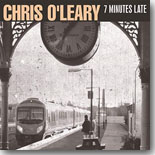 Chris O’Leary served as lead singer/front man
for Levon Helm’s Barnburner for six years,
touring the U.S. and Canada. His debut album,
Mr. Used To Be, won the 2011 Best New Artist
Debut CD Blues Blast Award. O’Leary’s latest CD,
7 Minutes Late (American Showplace Music), is
his fifth release, and it’s a gem, with 12
blues-infused originals that vary in style, but
definitely not in substance. Chris O’Leary served as lead singer/front man
for Levon Helm’s Barnburner for six years,
touring the U.S. and Canada. His debut album,
Mr. Used To Be, won the 2011 Best New Artist
Debut CD Blues Blast Award. O’Leary’s latest CD,
7 Minutes Late (American Showplace Music), is
his fifth release, and it’s a gem, with 12
blues-infused originals that vary in style, but
definitely not in substance.
Unique to O’Leary’s sound are the dual
saxophones of Andy Stahl and Chris Difrancesco,
and they figure prominently on the jet-fueled
opening track, “What The Devil Made Me Do,”
along with Jeremy Baum’s B3 and the soaring
guitar work from Peter Hopkinson and Chris
Vitarello. Guitarist Pete Kanaras guests on the
moody “Your Day Will Come,” and “One More Chance
at Love” has a funky, soulful vibe. “Second Time
Around” is a roadhouse rocker with plenty of
O’Leary’s tasty harmonica, Baum’s B3 and a crisp
guitar solo from Hopkinson.
“She Ain’t Coming Back” is a steady-rolling
country blues with a strong vocal and harp from
O’Leary, acoustic guitar from Hopkinson, and
mandolin from Greg Gumpel. “Circus Just Left
Town” has the New Orleans second line rhythm
going on, and is followed by the dark, ominous
title track, a tale of betrayal and revenge that
doesn’t have a happy ending. “Unbelievable”
lifts the mood considerably, an excellent
Memphis-flavored soul ballad, and is followed by
“Bones,” a swampy blues rocker, and “Heartbreak
Waiting To Happen,” a country-styled rocker.
“Driving Me Crazy” returns us to the Crescent
City, with Difrancesco’s clarinet giving the
track a nice tough of old school, and “Daddy’s
Here,” the album closer, is a terrific ballad
with a heartfelt vocal from O’Leary about
returning home to his family.
Chris O’Leary has given blues fans a lot to
enjoy with their well-crafted set. Be sure to
track down 7 Minutes Late at your earliest
convenience.
--- Graham Clarke
 Willa Vincitore returns with a sophomore
release, Choices, that continues and even
improves upon her excellent 2017 debut, Better
Days. The talented singer/songwriter offers nine
new originals with one well-chosen cover that
span the blues, soul, R&B, roots, and even a
little bit of gospel. Many of the musicians from
the previous effort return as well, including drummer Lee Falco, saxophonist Jay Collins, keyboardist
Scott Millici, along with bassist Brandon
Morrison and guitarist Chris Vitarello, who both
guest on one track. New guitarist Karl Allweier
and bassist Doug Abramson pick up the slack
quite well, thank you very much. Oh, yeah. Ms. Vincitore’s awe-inspiring voice is as potent as
ever, too. Willa Vincitore returns with a sophomore
release, Choices, that continues and even
improves upon her excellent 2017 debut, Better
Days. The talented singer/songwriter offers nine
new originals with one well-chosen cover that
span the blues, soul, R&B, roots, and even a
little bit of gospel. Many of the musicians from
the previous effort return as well, including drummer Lee Falco, saxophonist Jay Collins, keyboardist
Scott Millici, along with bassist Brandon
Morrison and guitarist Chris Vitarello, who both
guest on one track. New guitarist Karl Allweier
and bassist Doug Abramson pick up the slack
quite well, thank you very much. Oh, yeah. Ms. Vincitore’s awe-inspiring voice is as potent as
ever, too.
“Just Ain’t The Same” the funky opener, is a
tasty midtempo blues with R&B leanings. The
title track is a moving ballad with a gospel
feel where Vincitore reminds listeners that we
all have choices to make, good or bad, right or
wrong, and it’s up to us to make them.
Meanwhile, “Need A Little Help” sounds like ’80s
power pop with Vincitore’s strong vocal and
Allweier’s guitar work, and “Trust” is a fine
soul ballad with a cool R&B vibe, while “I Love
You Baby” is a sweet pop-flavored track.
Any music fan above a certain age will be able
to relate to “Everything Hurts,” a delightfully
honest tune about those doggone “middle-aged”
blues, and “Bite Me” is a feisty, funky rocker.
The ballad “It Is What It Is” features
Vincitore’s most powerful, heartfelt vocal, just
dripping with soul. The topical “These Days”
tells of the fear and uncertainty in the current
world to a cool urban, jazzy backdrop. The album
closer is also the lone cover, Annie Lennox’s
“Money Can’t Buy It,” a funky R&B track
reflecting on the power of love.
Willa Vincitore’s previous effort showed a
talented artist who had paid her dues and was
ready to step out on her own. Choices shows that
she is well on the way to establishing herself
as one of the top singer/songwriters on the
current blues and roots circuit.
--- Graham Clarke
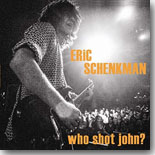 Eric Schenkman is best known as the guitarist
for the Spin Doctors, who enjoyed success on the
pop charts during the ’90s for hits like “Little
Miss Can’t Be Wrong” “Pocket Full of
Kryptonite,” and “Two Princes,” all of which he
co-authored. Schenkman’s third release, Who Shot
John? (Vizztone Records), is a entertaining,
fast-paced set of tunes that mixes blues with a
heady dose of funk, pop, and soul. Enlisting a
core band of Van Romaine (drums), Cody Dickinson
(drums/washboard/piano), and co-producer Shawn
Kellerman (bass), Schenkman rips through a
powerful set of ten originals that packs a live
wallop. Eric Schenkman is best known as the guitarist
for the Spin Doctors, who enjoyed success on the
pop charts during the ’90s for hits like “Little
Miss Can’t Be Wrong” “Pocket Full of
Kryptonite,” and “Two Princes,” all of which he
co-authored. Schenkman’s third release, Who Shot
John? (Vizztone Records), is a entertaining,
fast-paced set of tunes that mixes blues with a
heady dose of funk, pop, and soul. Enlisting a
core band of Van Romaine (drums), Cody Dickinson
(drums/washboard/piano), and co-producer Shawn
Kellerman (bass), Schenkman rips through a
powerful set of ten originals that packs a live
wallop.
“I’m Alright,” the blues rock-infused opener,
sets the bar pretty high for the album, but
Schenkman and company are more than up to the
task, as heard on the following mid-tempo rocking
shuffle “Locked In The House All Day” and the
electrified, old school back porch blues
“Lincoln’s Feat.” The title track follows, a
breakneck, funky Mardi Gras-themed high-stepper,
and “No Pain” is a hard rocker with a touch of
funk, while “Sign Of The Times” is a tasty slow
blues burner.
The upbeat “Far Away” has the exuberance and
energy for which the Spin Doctors were so noted,
and “Only A Fool,” a soulful love song, retains
that feel as well. The funky rumba “Fortune
Teller” is a quirky, but memorable change of
pace, and “Agent Orange Blues,” the album
closer, is a relentless, grungy boogie track
that must blow fans away when played live.
A gritty, energetic set of high-energy 21st
century blues and rock, Who Shot John? should
get a ton of airplay on blues radio, if there’s
any justice in the world.
--- Graham Clarke
 Gaye Adegbalola is probably best-known to blues
fans as the frontwoman for Saffire, The Uppity
Blues Women, but after the ladies called it a
day in 2009 she embarked on a solo career. As
most of her fans know, Adegbalola has never been
reluctant to express her views on politics and
modern culture, but she often does so with good
humor and style, so that whether or not you
agree with her politics or her cultural views
there’s plenty of great music and musical ideas
to take in. Such is the case with her latest
release, The Griot (Vizztone Records), a
typically powerful set that she calls “Topical
Blues For Topical Times.” Gaye Adegbalola is probably best-known to blues
fans as the frontwoman for Saffire, The Uppity
Blues Women, but after the ladies called it a
day in 2009 she embarked on a solo career. As
most of her fans know, Adegbalola has never been
reluctant to express her views on politics and
modern culture, but she often does so with good
humor and style, so that whether or not you
agree with her politics or her cultural views
there’s plenty of great music and musical ideas
to take in. Such is the case with her latest
release, The Griot (Vizztone Records), a
typically powerful set that she calls “Topical
Blues For Topical Times.”
The set is divided into
17 songs that
address a variety of subjects. Modern politics
and affairs are discussed beginning right off
the bat with “Nothing’s Changed,” a scathing
look at the current political landscape. The
title track follows, which is more or less Ms. Adegbalola’s “mission statement,” and is
followed by “Liearrhea,” a sharp jab at
hypocrisy. “FGM (Female Genital Mutilation)”
takes on an abusive act on women that’s still
practiced in some cultures, and the shuffle
“Dirty Sheets” is a poignant look at poverty. “(You’re) Flint Water” condemns pollution,
and the funky “Kaepernicked” looks at protest,
saluting the former NFL quarterback for his
actions.
“Ain’t Technology Grand?” discusses the
advantages of modern mobile devices, “Gon’ Be
Alright” talks about old age and the potential
loneliness that sometimes accompanies it, and
“Nothing Left…..” is a tragic look at mental
illness that will touch anyone who’s ever dealt
with it on either side. Next is one of three
covers on the album, Doc Pomus’ “(There Is
Always) One More Time,” is a touching symbol of
hope on the album.
A couple of the tunes are more personal,
covering sex and romance, as Ms. Adegbalola
covers Bessie Smith’s “Need A Little Sugar In My
Bowl,” and “Tea Cake Kinda Love” is a love song
to her significant other (in the liner notes,
Adegbalola states that she was inspired by Zora
Neale Hurston’s reference to her perfect lover
as “Tea Cake”). The humorous “3 Hour Shoes (Stylin’
For The Lord)” pokes fun at women who dress to
kill (sometimes uncomfortably) on Sundays. The
final track is Ma Rainey’s tale of betrayal,
“Jelly Bean Blues.”
Ms. Adegbalola is in fine voice on these tracks,
really pouring her whole heart into all of these
tracks, and also playing guitar and harmonica.
Jeff Covert handles the lead guitar duties,
along with bass, drums, percussion, banjo,
keyboards, and backing vocals. Other musicians
include Keith Armstead (organ), Roddy Barnes
(piano), John Freund (acoustic guitar), Queen
Lovelace (tambourine), Jackie Merritt (bones),
Chris Sexton (cello), and horns from Zack Smith
(trumpet), Davis Smith (trumpet), Steve
Patterson (saxophone), and Dan Haverstock
(trombone).
Gaye Adegbalola remains a powerful and
compelling voice of the blues after forty years.
The Griot shows that she’s still got plenty to
say about a variety of topics.
--- Graham Clarke
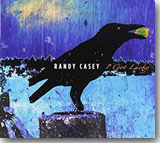 You may not have heard of
Randy Casey, but
chances are pretty good that you’ve heard him.
The guitarist has placed music on The Fall Guy
and other TV shows, NPR’s All Things Considered
and other radio shows, and on several
independent films as well as on commercials for
Target, H&R Block, Levi’s, and many others. He
also served as music director for Shannon Curfman when she was breaking on the blues
scene, and as a solo act he has opened for
Eddie Money and the North Mississippi Allstars.
He’s also recorded his own albums, with I Got Lucky
being his eighth release. You may not have heard of
Randy Casey, but
chances are pretty good that you’ve heard him.
The guitarist has placed music on The Fall Guy
and other TV shows, NPR’s All Things Considered
and other radio shows, and on several
independent films as well as on commercials for
Target, H&R Block, Levi’s, and many others. He
also served as music director for Shannon Curfman when she was breaking on the blues
scene, and as a solo act he has opened for
Eddie Money and the North Mississippi Allstars.
He’s also recorded his own albums, with I Got Lucky
being his eighth release.
The opener, “Bedbug Blues,” sounds like a
modernized, electrified version of an old Delta
blues classic with Casey laying down plenty of
mesmerizing slide guitar. The title track is a
funky blues boogie track with harp contributions
from John “Pinetree” Paynich, while “Six Feet Of
Rain” is a superb Southern blues rocker and
“Soo Line” is a slide-driven train song (and
some splendid slide at that!). Meanwhile, “Little
Weed,” offers more grungy slide guitar in a
countrified blues setting, and “Strange” is an
excellent piece of blues rock.
“One Step Ahead” reminded me a lot of those
great Little Feat tunes from the ’70s with
Casey’s slide guitar over a grungy Stones-esque
rhythm, “That Train” is acoustic country blues,
and “The Chaperone” is funky, R&B-based blues
backed by Casey’s wah-wah guitar. The slow
burner “New Old Landlord Blues” is a standout as
well, “Broken Arm Blues” returns to the Southern
rock arena, with fine slide guitar work, and the
closer, “Racing Stripes” is a nearly
eight-minute guitar fest that’s not nearly long
enough as Casey got the opportunity to put his
electric and acoustic chops on display.
I Got Lucky was inspired by a 1969 Gibson Les
Paul Custom that Casey beat out Cheap Trick
guitarist Rick Neilsen to get. It was actually
the first guitar that Casey ever played as a
kid. Neilsen’s loss was the blues world’s gain.
This is a well-rounded, well-played set that
should bring some much-deserved attention to
Randy Casey.
--- Graham Clarke
 Peace Of Mind (Swingnation Records) is
singer/songwriter/guitarist Danny Lynn Wilson’s
first release in 16 years. It’s a 13-song
set of original blues and roots. He’s joined on
these tracks by guitarist Dave Gross, who also
produced and played keyboards, Matt Raymond
(basses), and Ray Hangen (drums), along with a
host of guest artists on various tracks. This is
a warm, personal, intimate set of songs covering
everyday life subjects that will strike a chord
with any listener. Peace Of Mind (Swingnation Records) is
singer/songwriter/guitarist Danny Lynn Wilson’s
first release in 16 years. It’s a 13-song
set of original blues and roots. He’s joined on
these tracks by guitarist Dave Gross, who also
produced and played keyboards, Matt Raymond
(basses), and Ray Hangen (drums), along with a
host of guest artists on various tracks. This is
a warm, personal, intimate set of songs covering
everyday life subjects that will strike a chord
with any listener.
“When Will The Loving Start” is a somber opening
track, but Wilson’s distressed vocal performance
makes this track a memorable one, and “Sympathy
For Your Man” has a haunting vibe with Gross’
tasty reverb guitar work and Sean Daly’s lap
steel, while the jaunty title track adds banjo
from Gross and fiddle from Charles Burnham.
“Long Way Home” picks up the pace with
interesting results, while “Love Only You” takes
on a melancholy tone but is a vow of undying
love from Wilson. “Middle Class Blues”
adopts a old-timey tone as Wilson bemoans the
state of the economy for regular folks.
“Shine Is Off” is upbeat, but finds Wilson
reflecting on a love affair that seems to be
going sour, while “Arkansas Trotter” is a
swampy, southern-flavored rocker. “High Water”
has a classic old school blues feel with guest
Greg Gumpel on resonator guitar. The slow
but sweet “No Walls” has jazzy overtones, and the
lively “Fuss ‘n Fight” revisits that old-timey
groove. Meanwhile, “Too Many Hounds” is
well-done funky blues. The album closes with a
lovely ballad, “Galway Bay,” which brings Daly’s
lap steel back in glorious fashion.
A fine set of heartfelt blues and roots
originals, Danny Lynn Wilson’s Peace Of Mind is
a worthy listen for fans of both genres.
--- Graham Clarke
 Hot off the success of her self-titled debut
release, Ina Forsman was riding a huge wave of
popularity as she participated in Ruf Records’
2016 Blues Caravan tour. Loaded with inspiration
for songs on her next release she put those
ideas on her phone as she traveled, only to lose
that phone while in New York City along with
every bit of new material. Undeterred, Ms. Forsman set to work compiling a new bunch of
tunes, and apparently she overcame the adversity
quite well, thank you very much, if the songs
featured on her sophomore release, Been Meaning
To Tell You (Ruf Records), are any
indication. Quite well indeed. Hot off the success of her self-titled debut
release, Ina Forsman was riding a huge wave of
popularity as she participated in Ruf Records’
2016 Blues Caravan tour. Loaded with inspiration
for songs on her next release she put those
ideas on her phone as she traveled, only to lose
that phone while in New York City along with
every bit of new material. Undeterred, Ms. Forsman set to work compiling a new bunch of
tunes, and apparently she overcame the adversity
quite well, thank you very much, if the songs
featured on her sophomore release, Been Meaning
To Tell You (Ruf Records), are any
indication. Quite well indeed.
The ballad, “Be My Home,” opens the disc, a
piano-driven gospel track with Forsman’s
powerful vocal front and center. It’s followed
by “Get Mine,” which goes fast and funky with
wah wah guitar from Laura Chavez and Forsman’s
rapid-fire vocals. “All Good,” is just that,
a delightfully breezy shot of soul, while the
horn-fueled “Genius” mixes funk and R&B.
“Whatcha Gonna Do” is a look at a sexual
harassment from the male’s perspective. Quite
an unusual lyrical approach, which hits even
harder after hearing the next song, “Why You Gotta Be That Way,” which gives the female point
of view. Both of these songs deftly mix jazz and
R&B.
Forsman paints a sad portrait on the slow burner
“Miss Mistreated,” and Chavez’s sympathetic
guitar work nicely complements her heartfelt,
world weary vocal. On the ballad “Figure,” she’s
at her best, backed only by keyboards from Red
Young, and on the scrappy soul burner “Who Hurt
You,” the Texas Horns provide punchy
Memphis-like backing. “Every Single Beat” takes
up a Latin jazzy vibe, and “Chains” takes on a
world beat with chants and diverse means of
percussion. Finally, the closer, “Sunny,” is an
à capella showstopper that Forsman penned in
tribute to her sister.
Been Meaning To Tell You is an
exquisitely-crafted release, with excellent
songwriting and performances from Ina Forsman,
excellent musical performances, and peerless
production from Mark “Kaz” Kazanoff. Only 25
years old, Ms. Forsman is one for the blues
world to watch.
--- Graham Clarke
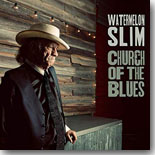 I’ve missed the last couple of albums from
Watermelon Slim, so I was glad to see a copy of
his latest release, Church Of The Blues (NorthernBlues
Music) sitting in my mailbox recently. Granted,
Slim’s gnarled and weathered vocal style may be
an acquired taste for some, but it’s a perfect
fit for his original songs which are truly
original songs from an true blues original, and
they breathe new life into old familiar
favorites when he takes them on. He’s also a
first-rate slide guitarist and harmonica player,
and I have always just gotten a kick out of his
recordings. I’ve missed the last couple of albums from
Watermelon Slim, so I was glad to see a copy of
his latest release, Church Of The Blues (NorthernBlues
Music) sitting in my mailbox recently. Granted,
Slim’s gnarled and weathered vocal style may be
an acquired taste for some, but it’s a perfect
fit for his original songs which are truly
original songs from an true blues original, and
they breathe new life into old familiar
favorites when he takes them on. He’s also a
first-rate slide guitarist and harmonica player,
and I have always just gotten a kick out of his
recordings.
This enjoyable new set includes
14 songs,
seven Slim originals and seven interesting
covers, and features a great set of guest
musicians, including guitarists Bob Margolin, Joe Louis
Walker, Albert Castiglia, and Nick Schnebelen,
along with contributing vocalists Sherman Holmes
and John Nemeth.
A
few of the tunes take a hard luck at current
affairs, such as Tom McFarland’s “Tax Man Blues”
(a lament fitting for most any era), and three
Slim originals: “ Post-Modern Blues,” a pointed
look at the current possessions-obsessed world,
“Mni Wiconi – The Water Song,” which chides man
for his wasteful ways, and “Charlottesville
(Blues For My Nation),” which laments the recent
the 2017 tragedy in Virginia.
“St. Peter’s Ledger,” from Ron L. Meadors,
finds Slim seeking assurance that he’s on the
road to salvation, not damnation, and his cover
of Muddy Waters’ “Gypsy Woman,” featuring Margolin’s
slide guitar teamed with Slim on harp, is
excellent. Margolin also appears on a cool cover
of Lee Dorsey’s (via Allen Toussaint) “Get Out
of My Life Woman,” with Slim being joined on
vocals by Nemeth and Holmes. A funky swinging
cover of Gene Barge’s “Me And My Woman,”
showcases Castiglia on guitar and Slim wailing
away on harp.
Slim also tackles the Wolf’s “Smokestack
Lightning,” giving it more of a country blues
feel with his soaring slide guitar. On
Mississippi Fred McDowell’s droning “61
Highway,” Slim shares the spotlight with his
regular band mates, John Allouise (bass) and
Brian Wells (drums), while Castiglia joins in
again on guitar for a wild take (is there any
other kind?) on J.B. Hutto’s “Too Much Alcohol.”
The last two Slim originals are “The Ole 1-4-5,”
which has that country bluesy feel that was
prevalent on some of Slim’s early 2010
releases, and also features his former guitarist
Ike Lamb. The acapella “Holler #4,” is just
Slim, well, hollering the blues as only he can,
accompanied by a percussive stomp and his
plaintive harmonica.
Church Of The Blues is probably my favorite
Watermelon Slim release to date. This set seems
to capture the essence of the man’s music and
what makes him tick more than any other I’ve
heard. His fans will love it, and he might even
earn a few new ones in the process.
--- Graham Clarke
 This
intriguing, mature, and popular band of Scottish
troubadours was fermented in vintage blues,
American southern rock, and 1960s psychedelia,
then steeped in influences from Robert Johnson
to The Rolling Stones. Their sound was
subsequently distilled in a boiler of mercurial
energy before the secret, final ingredient was
added, namely the considerable talents of each
musician. Welcome to the creation known as
Safehouse. This
intriguing, mature, and popular band of Scottish
troubadours was fermented in vintage blues,
American southern rock, and 1960s psychedelia,
then steeped in influences from Robert Johnson
to The Rolling Stones. Their sound was
subsequently distilled in a boiler of mercurial
energy before the secret, final ingredient was
added, namely the considerable talents of each
musician. Welcome to the creation known as
Safehouse.
Absolutely Live Volume 2 (Independent)
opens with Moby Grapes’ “Hey Grandma”, the '60s
San Francisco vibe is enhanced by aspects of the
Black Crowes’ version to which charismatic
singer Chris Peebles further adds his unique,
gritty vocals to make it Safehouse’s own take on
a classic song. “Travelling Light,” co-written
by lead guitarist John Bruce introduces some
sumptuous slide to complement Ali Petrie’s
haunting keyboard accompaniment.
The infectious riffs of “Can’t You See,” written
by Toy Caldwell of the Marshall Tucker Band,
cross the boundary between country and southern
rock, its dark lyrics the perfect vehicle for
Peebles’ powerful, anguished vocals. Petrie and
Bruce take it in turn to deliver scintillating,
innovative solos, Peebles swirling in a frenzy
between them in time with the dynamic peaks and
troughs.
The slow burning “No Expectations” is a nod to
the Stones, with Chris almost mimicking Jagger’s
voice and swagger as he communicates the
narrative with style and panache. Bruce’s
stunning guitar work on the self-penned
mid-tempo “Jayburger Boogie” shows why the
veteran axeman, after over 40 years supporting
the biggest names in US and UK blues, is finally
achieving the recognition he deserves. Bruce is
billed to appear alongside Marcus Bonfanti at
this summer’s Edinburgh Jazz and Blues Festival,
a partnership which promises to be a major
highlight of the week. “Breathe In” is a Chris
Peebles composition and worthy of his exquisite
vocal delivery complemented by Petrie’s precise,
fluent and innovative keys in this beautifully
arranged song.
Grateful Dead made Bonnie Dobson’s
post-Apocalyptic folk rock song, “Morning Dew,”
famous, however, the faster pace and complex
rhythm patterns from drummer Sean Scott and
bassist Andrew Stirling give this interpretation
an edgier slant. The band’s original,
hard-rocking anthemic “Coming Alive” has the
spontaneity of a jam session whilst retaining an
underlying structure and introducing elements of
light and shade. The atmosphere changes with the
gentle rockabilly start to “Pay Day,” the five
musicians in perfect harmony and exuding
enjoyment, the crescendos kicking in later.
The funky rhythms, jazz-infused keys and
smouldering vocals on Sonny Boy Williamson II’s
“One Way Out “are a tribute to The Allman
Brothers, providing a fitting finale to a show
which really needs to be experienced live to be
believed.
--- Dave Scott
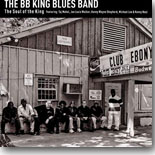 B.B.
King left us a few years ago, but the 10
musicians who often backed him on tour are still
around and still capable of playing the blues at
a very high level. They all got together for
this particular session, billing themselves
simply as The BB King Blues Band,
bringing in an all-star cast of special guests
for The Soul of the King (Ruf Records).
As expected, this is an outstanding album with
13 cuts, many of them B.B. standards. Blues fans
are going to be familiar with most of the songs
here, but The Soul of the King doesn't
come across as being done by a bunch of B.B.
King imitator. Instead, the band and guests
wound up putting a lot of their own
personalities and styles into the recordings. B.B.
King left us a few years ago, but the 10
musicians who often backed him on tour are still
around and still capable of playing the blues at
a very high level. They all got together for
this particular session, billing themselves
simply as The BB King Blues Band,
bringing in an all-star cast of special guests
for The Soul of the King (Ruf Records).
As expected, this is an outstanding album with
13 cuts, many of them B.B. standards. Blues fans
are going to be familiar with most of the songs
here, but The Soul of the King doesn't
come across as being done by a bunch of B.B.
King imitator. Instead, the band and guests
wound up putting a lot of their own
personalities and styles into the recordings.
Of
course, "Sweet Little Angel" is here, but guest
vocalist / guitarist Kenny Neal gives it more of
his swamp blues sound. The other B.B. standard,
this one closing the disc, is "The Thrill Is
Gone," given more of a funky treatment with
vocals and guitar from Michael Lee, who did this
song when a contestant on NBC's The Voice
talent show. This young man has a voice with
plenty of soul, and we hear it on this number.
Diunna Greanleaf takes it to church on the slow
blues "There Must Be A Better World Somewhere,"
with astounding alto sax playing from Eric
Demmer. In fact, Demmer is the unsung star of
this collection, and he's certainly worthy of
having an album of his own someday soon. Demmer
also stars on the blues shuffle "Paying The Cost
To Be The Boss," with vocals shared by Mary
Griffin and Taj Mahal. It's a killer cut, with
Ms. Griffin's voice being a real revelation to
those of us not familiar with her work. We later
hear more from Demmer when he also handles
vocals on the slow blues "She's The One." Yes
sir, this man can do it all!
"Low
Down" has a real New Orleans second line vibe to
it, thanks to trumpet by Lamar Boulet and tuba
from Kirk Joseph. It was written by bandleader /
guitarist Russell Jackson who takes the lead
vocals. Another tune that takes us down to the
river is "Becoming The Blues," with Jackson and
Greenleaf sharing vocals while Neal blows some
nice harmonica.
James "Boogaloo" Bolden handles the vocals on
his own composition, the funky "Hey There Pretty
Woman," which also serves as still another
opportunity for Demmer's wonderful sax playing.
As I said before, someone please give this man a
starring role. Bolden returns for another of his
own numbers, the mid-tempo shuffle, "Here Today,
Gone Tomorrow," with plenty of brass behind him.
Darrell Lavigne contributes some mighty fine
piano playing to this number.
"Regal Blues (A Tribute To The King)" features
Joe Louis Walker on both guitar and vocals as he
sings about how B.B. influenced his career ---
"... When I first heard Lucille, it knocked me
out, yeah rock me baby, made me jump and shout,
went down and bought me a guitar, Lord, I tried
to figure it out ..." It's a mid-tempo blues
shuffle with solid guitar solos from JLW and
plenty of brassy horn accompaniment.
Not
only does The Soul of the King give us a
chance to hear different versions of blues
classics, but also provides some lesser-known
blues cats a chance in the limelight. There are
more songs than what I mentioned and they're all
good, so don't hesitate to add this album to
your collection.
--- Bill Mitchell
 I
didn't think I was going to like Taking It To
The Street (Gulf Coast Records) by St. Louis
guitarist Tony Campanella when I first
popped it into my CD player. The guitar playing
was more rocked out than I usually like and at
first I didn't think too much of Campanella's
vocals. I'm glad I resisted the temptation to
toss it aside, because the more I listened to
Taking It To The Street the more I liked it.
The music started to grow on me after a couple
of cuts. The album was produced by Mike Zito,
who seems to have his hand in quite a few
recordings over the last few years, and features
a tight band consisting of Campanella, bass
guitarist Terry Dry, drummer Matt Johnson and
keyboard player Lewis Stephens, as well as Zito
sitting in on rhythm and slide guitar. I
didn't think I was going to like Taking It To
The Street (Gulf Coast Records) by St. Louis
guitarist Tony Campanella when I first
popped it into my CD player. The guitar playing
was more rocked out than I usually like and at
first I didn't think too much of Campanella's
vocals. I'm glad I resisted the temptation to
toss it aside, because the more I listened to
Taking It To The Street the more I liked it.
The music started to grow on me after a couple
of cuts. The album was produced by Mike Zito,
who seems to have his hand in quite a few
recordings over the last few years, and features
a tight band consisting of Campanella, bass
guitarist Terry Dry, drummer Matt Johnson and
keyboard player Lewis Stephens, as well as Zito
sitting in on rhythm and slide guitar.
The
number that drips with blues the most is the
slow tune "One Foot In The Blues," with heavy,
echo-ey tone to Campanella's guitar playing. The
cover of Eddie Vinson's "Mr. Cleanhead" is
another solid slow blues, appropriate for
Campanella since he keeps his own pate pretty
clear of follicles. His best vocal work is heard
here as well as more tasteful, restrained
guitar. Nice organ accompaniment from Stephens,
too.
Sonny Boy Williamson's "Checking On My Baby"
gets a good treatment with a little funk
inserted. I especially like Campanella's more
intricate blues licks on this one. The up-tempo
blues shuffle, "My Motor's Running," co-written
by Zito and executive producer Guy Hale, is one
of the better cuts with nice guitar work from
Campanella.
Taking It To The Street closes with a
Campanella compositon, the slow, soulful blues
"Those Are The Times." There's plenty of emotion
packed into this song, although at times his
vocals need to show a little more power for the
proper effect.
This
album is worth checking out, especially if
you're into the more rockin' side of the blues.
If you find yourself in St. Louis, don't
hesitate to check out Mr. Campanella and his
band at some venue around the city.
--- Bill Mitchell
|